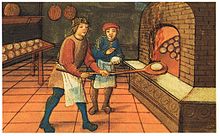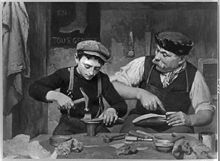學徒
实习工人
(重定向自學徒制)
學徒是開始從事某種手藝活的實習者,通過給僱主當學徒,他們可以獲得相應的就業憑證和經驗,或者得到僱主續約。從學徒畢業的人就會成為熟練工人。其性質和現代更常見的實習生完全不同。不同地區不同時代的學徒期也不同,從三年至七年都有。旧式学徒通常会雇主之间形成一定的人身依附关系,甚而是一種地區性、家族淵源內薦式的封閉型技藝傳承,絕非今天那種採納工作經驗、學歷或正式社會身分而聘用的實習生。


歷史
编辑歐洲學徒系統出現在中世紀晚期,受同業公會和當地政府的監督。一名手藝好的業內大師是學徒的僱主,他為學徒提供食宿和培訓,以此換取廉價的勞動力。大多數的學徒都是男性,但像皮匠、裁縫師和麵包師這樣的職業中就會有女性學徒。[1][2]他們在十到十五歲時成為學徒,在完成七年左右的學徒合同之後就可能對此領域有相當的熟悉程度了,但要在業內佔據一席之地或許還要經歷熟練工時期并成立自己的作坊。
後來一些大學也開始使用學徒系統培訓學者,根據亞當·斯密的說法,像研究生這樣需要導師監督的學位原來就算是學徒的一種。另一方面,當時一些古老城鎮會使用University of smiths(鐵匠協會)、University of tailors(裁縫協會)等名稱來指代這些行業工會組織。[3]
實際上學徒制這類機制是人類工藝傳承的自然之舉,根本無需多加追尋歷史或證明,這是一種自然而然不證自明的社會工藝傳承文化。直到今天無論是新進職員,又或是藍領的學徒,仍舊帶有傳統色彩學徒文化,雖然現在的學徒與師傅的關係不再如同古代一樣緊密,但仍只有少數依附於官僚體制的體制內工作可以做到比較與傳統學徒文化斷離的狀況。
另見
编辑參考文獻
编辑- ^ Apprenticeship indenture. Cambridge University Library Archives (Luard 179/9). March 18, 1642 [2015-01-08]. (原始内容存档于2019-05-21).
- ^ Apprenticeship indentures 1604 - 1697. Cambridge St Edward Parish Church archives (KP28/14/2). [2009-12-07]. (原始内容存档于2011-08-13).
- ^ Smith, Adam. Wealth of Nations: An Inquiry Into the Nature and Causes of The Wealth of Nations. London: W. Strahan and T. Cadell. 1776 [2015-01-08]. (原始内容存档于2015-01-08).
擴展閱讀
编辑- Modern Apprenticeships: the way to work, The Report of the Modern Apprenticeship Advisory Committee, 2001 [1]
- Apprenticeship in the British "Training Market", Paul Ryan and Lorna Unwin, University of Cambridge and University of Leicester, 2001 [2](页面存档备份,存于互联网档案馆)
- Creating a ‘Modern Apprenticeship’: a critique of the UK’s multi-sector, social inclusion approach Alison Fuller and Lorna Unwin, 2003 (pdf)(页面存档备份,存于互联网档案馆)
- Apprenticeship systems in England and Germany: decline and survival. Thomas Deissinger in: Towards a history of vocational education and training (VET) in Europe in a comparative perspective, 2002 (pdf)
- European vocational training systems: the theoretical context of historical development. Wolf-Dietrich Greinert, 2002 in Towards a history of vocational education and training (VET) in Europe in a comparative perspective. (pdf)
- Apprenticeships in the UK- their design, development and implementation, Miranda E Pye, Keith C Pye, Dr Emma Wisby, Sector Skills Development Agency, 2004 (pdf)
- L’apprentissage a changé, c’est le moment d’y penser !, Ministère de l’emploi, du travail et de la cohésion sociale, 2005
- Learning on the Shop Floor: Historical Perspectives on Apprenticeship, Bert De Munck, Steven L. Kaplan, Hugo Soly. Berghahn Books, 2007. (Preview on Google books)(页面存档备份,存于互联网档案馆)
- "The social production of technical work: the case of British engineers" Peter Whalley, SUNY Press 1986.
- "Apprenticeship in the ‘golden age’: were youth transitions really smooth and unproblematic back then?", Sarah A.Vickerstaff, University of Kent, UK, 2003
- "The Higher Apprenticeship (HA) in Engineering Technology"; The Sector Skills Council for Science, Engineering and Manufacturing technologies, UK, 2008